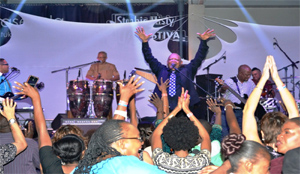
• King of jazz Hugh Masekela performing at the Stanbic Bank Misty Jazz festival, which was held at Levy Mall last weekend in Lusaka.
By Zarina Geloo –
THERE are moments when everything pales into insignificance as greatness takes over, last Saturday was such a night at the rooftop of Levy Mall where the Misty Jazz club and Stanbic organised a jazz festival.
The audience was treated to a buffet menu of jazz music, each one, Pompi, Scarlet, Mumba Yachi, the indomitable Maureen Lilanda and the outstanding and epic Oliver Mukutudzi offering up music that transported into a kind of jazz heaven.
But the audience knew who they paid K800, K300 and K200 respectively to see – the 73 year old Hugh Masekela, King of jazz who could have brought the house down, if there had been a roof.
Masekela brought his trademark weapons to the show – his voice, gruff, sexy and undiminished by age at the lower edges, when he begins in his showman chant, he then moves up the scale to a mellow in the middle and then quite naturally moves on reaching the higher octaves all the while augmenting the lyrics with narration or simply falling into a soft poem.
Then there is his flugelhorn.
Masekela works it like magic.
Armed with these two, he produces music that is warm and robust, no need for pyrotechnics.
He adds tinges of gravity to his music, teasing, evoking playfulness and then seamlessly plunges into Afro-pop-funk, stirring the audience into frenzy.
Eyes are transfixed, as Masekela the King of jazz, the born showman, has the audience hanging onto his every note.
The South African jazz artiste sings with a wild abandon; he sent flugelhorn lines plunging and soaring; he delighted the audience at the Festival with a string of anecdotes, jokes and social and political statements.
His patter was sometimes sentimental – “thank you, you people of Zambia, we are going to make you go on tour with us from now” – but it also came with statements that reminded you of the courageous battles this long-time anti-apartheid campaigner had fought.
Masekela, has visited Zambia several times during and after his exile years, and went off on a enjoyable riff about actually being from Ndola (“my real name is Chileshe”).
It was very entertaining and gave credence to the accolades that six decades down the line, he is still one of Africa’s greatest jazz musicians.
Being the confident great musician that he is, Masekela gives credit to his backing quintet that crosses over several generations, all of them schooled in the Cape Town music scene. Outstandingly was the youngest band member Cameron John Ward, whose stunning stylistic range and sweet guitar licks were such a feature of the show.
Masekela told the crowd, when introducing Ward that they must not tell anyone they had seen Ward playing: “because he is on probation from the criminal school for boys and the police and his mother are still looking for him”.
Putting down his horn and picking up a cowbell, Masekela’s roused the crowd to a nostalgic moment when he gently and mournfully came in with his song Stimela, a story he tells in a poignant voice full of emotion of African workers taking the train from all parts of the continent to find work in the South African mines.
His evocation of the locomotive, using his rasping chant, piercing screams and whistles, you could sense the implication of human tragedy underneath, and his gravelly voice, so guttural at the lower range, was just so unique and coupled with the sound of the cowbell foretold not just the journey, but its destination.
The song then reached a crescendo with flugelhorn and guitar, and the crowd went wild.
Masekela concluded the night with another evocative and playful piece of music and narrative from FelaKuti’s enduring hit song “African woman”.
There was an irresistible glow to Masekela’s music with the audience either dancing in their seats or in the aisles, through all the showmanship; it was his unmistakable golden flugelhorn tone that left the audience entranced.
The festival was great and the selection of artistes was truly an attempt at giving the best of jazz lovers a feast, but unfortunately, the organisation of the event truly suffered from a lack of preparation.
Some VVIP and VIP ticket holders were made to stand because of inadequate seating capacity, the ushers were not adequately prepared in their duties and did not seem to understand that their job was to serve food and drinks.
Food and drinks appeared to have run out and there was a crush for refreshments.
Extra chairs being brought in at the last minute, only showed that quality over quantity is always the best option, while the audience was generally forgiving in this instance.
It may not be quite as understanding the next time around. The disorganisation did not take away from the show itself, but it did dim the standing of the Misty and Stanbic.






